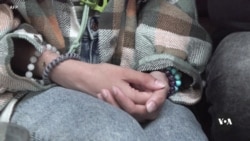Thousands of Russians, including soldiers, have fled their country to seek asylum in the West since Moscow's 2022 invasion of Ukraine, although only a fraction of asylum applications has been approved. However, in a landmark case, France has allowed several Russian army deserters to enter the country to seek refugee status. Anti-war activists hope it will prompt more Russian soldiers to flee.
Alexander, who does not want to give his family name for fear of political retaliation, is among the six Russian men and four of their partners permitted to enter France in recent months. He and his wife, Irina, are now living in the French city of Caen as they await a court decision on their asylum applications.
In January 2022, as Russia was preparing its full-scale invasion of Ukraine, Alexander recounted that he was told to go to Russian-occupied Crimea for military exercises. He did not want to go — but was told he had no choice.
Instead, his unit crossed the border into Ukraine as part of the invasion force.
"I was personally in shock; I didn't understand what was happening," Alexander told Agence France-Presse in an interview. "We had just crossed the border into Ukraine. I went to see my commander and asked him: 'What's going on? Why are we here? Why have we crossed the border? Why are we on the territory of another country?' ... I didn't get any answers to my questions."
Alexander eventually managed to flee the army. "I realized then that I only had two choices: either leave Russia or go to prison. Because going back to the front — I didn't have the slightest desire, nor the moral possibility," he said.
"Maybe, thanks to my example, someone will be inspired and want to quit the army. The weaker the army at the front is, the fewer people there are, the quicker the war will end and Ukraine will win," the 26-year-old told AFP.
Alexander and Irina initially fled to Kazakhstan, where they connected with other Russians escaping the war. However, many Russian exiles say they don't feel safe in former Soviet countries. Army deserters face 10 years or more in prison if caught and returned to Russia.
A French court ruled in 2023 that Russians who refuse to fight can claim refugee status, but most are not able to travel abroad to lodge an asylum application, said Ian Bond, a Russia expert and deputy director of the Centre for European Reform.
"It's relatively easy for Russians still to get to countries in the former Soviet Union. Russians have two passports — they have an internal passport and some have a foreign passport. Particularly for people of military age or active servicemen, even getting their hands on a foreign passport is extremely difficult," Bond told VOA.
But France granted permission for Alexander and Irina, along with eight other Russians, to enter the country and apply for asylum. It's believed they arrived in Paris on separate flights from Kazakhstan without passports or travel documents, although the exact details of their journeys have not been released.
"There are a number of ways in which they could have gotten to France, and I think they're not the first Russian deserters to get asylum in the West. But this seems to be a larger group — rather than in the past [when] I think there have just been some scattered individuals," said analyst Bond.
The decision followed months of advocacy and campaigning by organizations like Paris-based Russie-Libertes, which encourage Russians to desert the army. The groups say the deserters were meticulously vetted for their anti-war stance.
Olga Prokopieva, the head of Russie-Libertes, said France's decision to allow the group of army deserters into the country was "unprecedented" and urged other European countries to follow suit. "It has taken us a year of talks. We have tried so many things," she told Agence France-Presse.
However, Prokopieva told VOA via email on October 29 that Russie-Libertes would no longer be commenting on or publicizing the case, an indication of the sensitivity of the asylum applications.
Get Lost, a Georgia-based organization that helps Russians flee their country, claims to have aided more than 38,000 people, including thousands of soldiers. It also helped Alexander and Irina, along with the eight other Russians allowed to enter France.
Many European nations will have security concerns, said Ian Bond of the Centre for European Reform.
"There will be some, maybe in eastern Europe, who will say Russians are always a security risk; we should not be encouraging this. There will be others, and I would be among them, who would say the more people that we can encourage to leave Russia, the more acute [Russian President Vladimir] Putin's shortage of manpower will be — not just for the armed forces, but also for the military industrial complex."
"I think the fact that Russia has brought some thousands of North Korean troops to the battlefield is an indication that the manpower shortage is really starting to bite. But certainly, you'll have to scrutinize these people quite closely to make sure that you aren't importing Russian special forces disguised as deserters," Bond told VOA.
It's not clear if France intends to allow more Russian deserters to enter the country and claim asylum. The French foreign ministry did not respond to VOA requests for comment.
Since fleeing Russia, deserter Alexander and Irina have created a YouTube channel aimed at other Russian soldiers.
"Maybe with the help of this YouTube channel, the soldiers who have already taken this step, who have left their unit, Russia, the conflict zone, will be able to pass on these ideas to those who are still there, who are at a crossroads, who decide to flee or stay," Irina said.
Sergei, another of the Russian deserters permitted to enter France, said Russian soldiers always have a choice.
"There is always a possibility to lay down your arms, not to kill other people and to end your participation in this war," the 27-year-old told AFP. Thousands of Russians, including soldiers, have fled their country to seek asylum in the West since Moscow's 2022 invasion of Ukraine, although only a fraction of asylum applications has been approved. However, in a landmark case, France has allowed several Russian army deserters to enter the country to seek refugee status. Anti-war activists hope it will prompt more Russian soldiers to flee.
Alexander, who does not want to give his family name for fear of political retaliation, is among the six Russian men and four of their partners permitted to enter France in recent months. He and his wife, Irina, are now living in the French city of Caen as they await a court decision on their asylum applications.
In January 2022, as Russia was preparing its full-scale invasion of Ukraine, Alexander recounted that he was told to go to Russian-occupied Crimea for military exercises. He did not want to go — but was told he had no choice.
Instead, his unit crossed the border into Ukraine as part of the invasion force.
"I was personally in shock; I didn't understand what was happening," Alexander told Agence France-Presse in an interview. "We had just crossed the border into Ukraine. I went to see my commander and asked him: 'What's going on? Why are we here? Why have we crossed the border? Why are we on the territory of another country?' ... I didn't get any answers to my questions."
Alexander eventually managed to flee the army. "I realized then that I only had two choices: either leave Russia or go to prison. Because going back to the front — I didn't have the slightest desire, nor the moral possibility," he said.
"Maybe, thanks to my example, someone will be inspired and want to quit the army. The weaker the army at the front is, the fewer people there are, the quicker the war will end and Ukraine will win," the 26-year-old told AFP.
Alexander and Irina initially fled to Kazakhstan, where they connected with other Russians escaping the war. However, many Russian exiles say they don't feel safe in former Soviet countries. Army deserters face 10 years or more in prison if caught and returned to Russia.
A French court ruled in 2023 that Russians who refuse to fight can claim refugee status, but most are not able to travel abroad to lodge an asylum application, said Ian Bond, a Russia expert and deputy director of the Centre for European Reform.
"It's relatively easy for Russians still to get to countries in the former Soviet Union. Russians have two passports — they have an internal passport and some have a foreign passport. Particularly for people of military age or active servicemen, even getting their hands on a foreign passport is extremely difficult," Bond told VOA.
But France granted permission for Alexander and Irina, along with eight other Russians, to enter the country and apply for asylum. It's believed they arrived in Paris on separate flights from Kazakhstan without passports or travel documents, although the exact details of their journeys have not been released.
"There are a number of ways in which they could have gotten to France, and I think they're not the first Russian deserters to get asylum in the West. But this seems to be a larger group — rather than in the past [when] I think there have just been some scattered individuals," said analyst Bond.
The decision followed months of advocacy and campaigning by organizations like Paris-based Russie-Libertes, which encourage Russians to desert the army. The groups say the deserters were meticulously vetted for their anti-war stance.
Olga Prokopieva, the head of Russie-Libertes, said France's decision to allow the group of army deserters into the country was "unprecedented" and urged other European countries to follow suit. "It has taken us a year of talks. We have tried so many things," she told Agence France-Presse.
However, Prokopieva told VOA via email on October 29 that Russie-Libertes would no longer be commenting on or publicizing the case, an indication of the sensitivity of the asylum applications.
Get Lost, a Georgia-based organization that helps Russians flee their country, claims to have aided more than 38,000 people, including thousands of soldiers. It also helped Alexander and Irina, along with the eight other Russians allowed to enter France.
Many European nations will have security concerns, said Ian Bond of the Centre for European Reform.
"There will be some, maybe in eastern Europe, who will say Russians are always a security risk; we should not be encouraging this. There will be others, and I would be among them, who would say the more people that we can encourage to leave Russia, the more acute [Russian President Vladimir] Putin's shortage of manpower will be — not just for the armed forces, but also for the military industrial complex."
"I think the fact that Russia has brought some thousands of North Korean troops to the battlefield is an indication that the manpower shortage is really starting to bite. But certainly, you'll have to scrutinize these people quite closely to make sure that you aren't importing Russian special forces disguised as deserters," Bond told VOA.
It's not clear if France intends to allow more Russian deserters to enter the country and claim asylum. The French foreign ministry did not respond to VOA requests for comment.
Since fleeing Russia, deserter Alexander and Irina have created a YouTube channel aimed at other Russian soldiers.
"Maybe with the help of this YouTube channel, the soldiers who have already taken this step, who have left their unit, Russia, the conflict zone, will be able to pass on these ideas to those who are still there, who are at a crossroads, who decide to flee or stay," Irina said.
Sergei, another of the Russian deserters permitted to enter France, said Russian soldiers always have a choice.
"There is always a possibility to lay down your arms, not to kill other people and to end your participation in this war," the 27-year-old told AFP.







